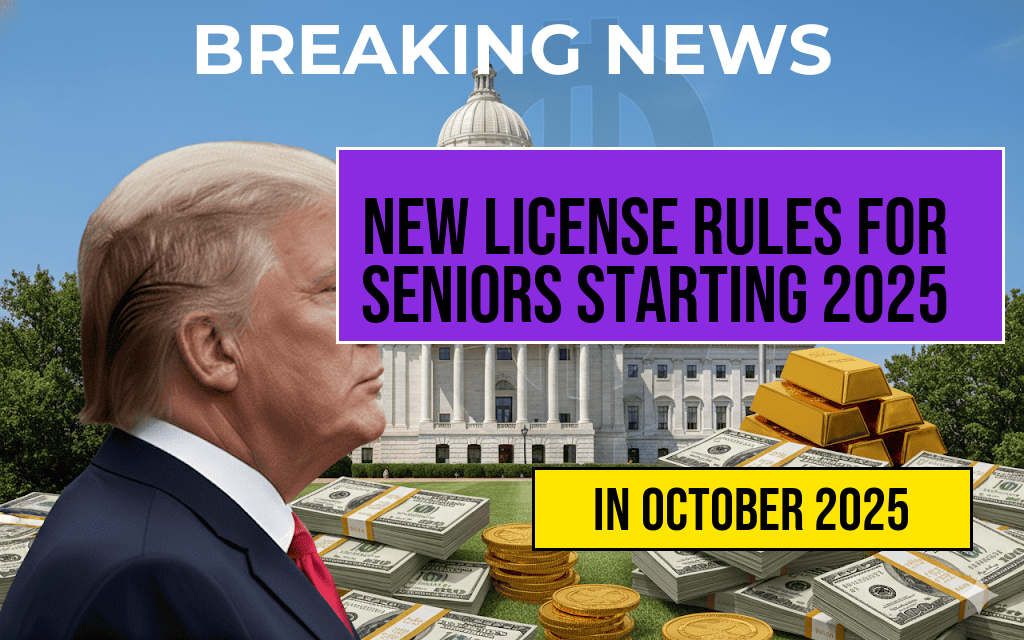The U.S. Department of Motor Vehicles (DMV) announced upcoming changes to driving license requirements for senior drivers, set to take effect nationwide starting October 2025. These new regulations specifically target drivers aged 70 and older, aiming to enhance road safety while accommodating the needs of aging motorists. Under the updated protocols, eligible seniors will face more comprehensive assessments, including vision tests, cognitive evaluations, and practical driving examinations. State agencies are also expected to implement digital tools to streamline the licensing process, though in-person assessments will remain a cornerstone for many applicants. The initiative reflects growing concerns over age-related declines in driving ability and the need for balanced policies that preserve mobility without compromising safety. Experts emphasize that these changes seek to foster a more secure driving environment for all road users, while also ensuring that senior drivers retain their independence through tailored support measures.
Key Highlights of the New Senior Driver Licensing Requirements
Enhanced Vision and Cognitive Testing
- Mandatory vision screenings for drivers aged 70 and above, conducted at licensed eye care providers or DMV offices.
- Introduction of cognitive assessments designed to identify potential impairments affecting reaction times, decision-making, and attention span.
- Tests will be standardized across states, with some jurisdictions adopting computer-based evaluations for efficiency.
Periodic Reevaluation and Licensing Renewals
- Drivers in the specified age group will be required to renew their licenses every 2 years, instead of the traditional 4-year cycle.
- Renewal processes will include mandatory assessments unless the driver has previously demonstrated satisfactory testing results.
- States may offer special exemptions for drivers with documented medical conditions, provided they submit supporting healthcare documentation.
In-Person and Practical Driving Evaluations
- Senior drivers will undergo behind-the-wheel tests focused on current traffic laws, situational awareness, and vehicle control.
- Participants can choose to complete these evaluations at DMV offices or certified third-party driving schools.
- Recertification may be waived for drivers with recent medical clearance indicating no significant impairments.
Implementation Timeline and State Variations
While the federal framework sets the October 2025 deadline, individual states will administer the new requirements according to their administrative procedures. Some jurisdictions, such as California and New York, have already begun pilot programs testing enhanced senior assessments, and they anticipate full rollout by late 2024 to prepare for the national mandate. Other states may adjust the frequency or scope of testing based on local demographics and resource availability. The Department of Homeland Security (DHS) and the National Highway Traffic Safety Administration (NHTSA) are coordinating efforts to ensure consistency across states, as outlined in their recent policy guidance (NHTSA overview).
Implications for Senior Drivers and the Driving Community
Advocates for senior mobility acknowledge that while these new measures aim to improve safety, they also raise concerns about potential restrictions on independence for older adults. To address this, several states are exploring driver assistance programs that include refresher courses, transportation alternatives, and technological aids such as advanced driver-assistance systems (ADAS). Meanwhile, healthcare providers are encouraged to work closely with patients to evaluate driving fitness regularly and provide guidance tailored to individual needs.
Public Response and Expert Opinions
| Expert | Position | Comments |
|---|---|---|
| Dr. Lisa Carter | Geriatric Physician | “Regular assessments can help identify issues early and ensure that senior drivers remain safe on the roads.” |
| Michael Jenkins | Transportation Policy Analyst | “Balancing safety with independence is key. Flexible policies that accommodate individual health statuses are essential.” |
| Susan Ramirez | Senior Advocacy Group Leader | “Education and support services are crucial to help seniors adapt to new requirements without feeling penalized.” |
As the October 2025 deadline approaches, state agencies are preparing to implement these updates, emphasizing transparency and support. For many seniors, maintaining their driving privileges is integral to independence and quality of life, but safety considerations remain paramount. The upcoming changes aim to foster a more secure driving environment by ensuring that drivers aged 70 and older are evaluated with thorough, standardized procedures, integrating medical insights with practical assessments. The evolving policies reflect a broader national effort to adapt transportation regulations to demographic shifts and technological advances, striving to keep roads safe for everyone (Learn more about U.S. licensing standards).
Frequently Asked Questions
What are the new driving license requirements for seniors starting October 2025?
Beginning October 2025, drivers aged 70 and older will need to meet additional requirements such as vision tests, health screenings, and possibly retaking certain driving assessments to renew their driving licenses.
Who is affected by the new driving license requirements?
The new requirements specifically target drivers aged 70 and older who are seeking to renew or obtain their driving licenses in the United States.
What documents will seniors need to provide under the new regulations?
Seniors will be required to submit medical documentation verifying their fitness to drive and may need to pass vision tests or other health assessments as part of the license renewal process.
Are there any exceptions or special provisions for seniors with health issues?
Yes, seniors with specific health conditions or disabilities may be eligible for special accommodations or may be required to undergo additional evaluations to ensure safe driving.
How will these new requirements impact the licensing process timeline for seniors?
The licensing process may take longer for seniors due to additional testing and document verification, so it is advisable to plan ahead and allow extra time when renewing or obtaining a driver’s license.

Leave a Reply